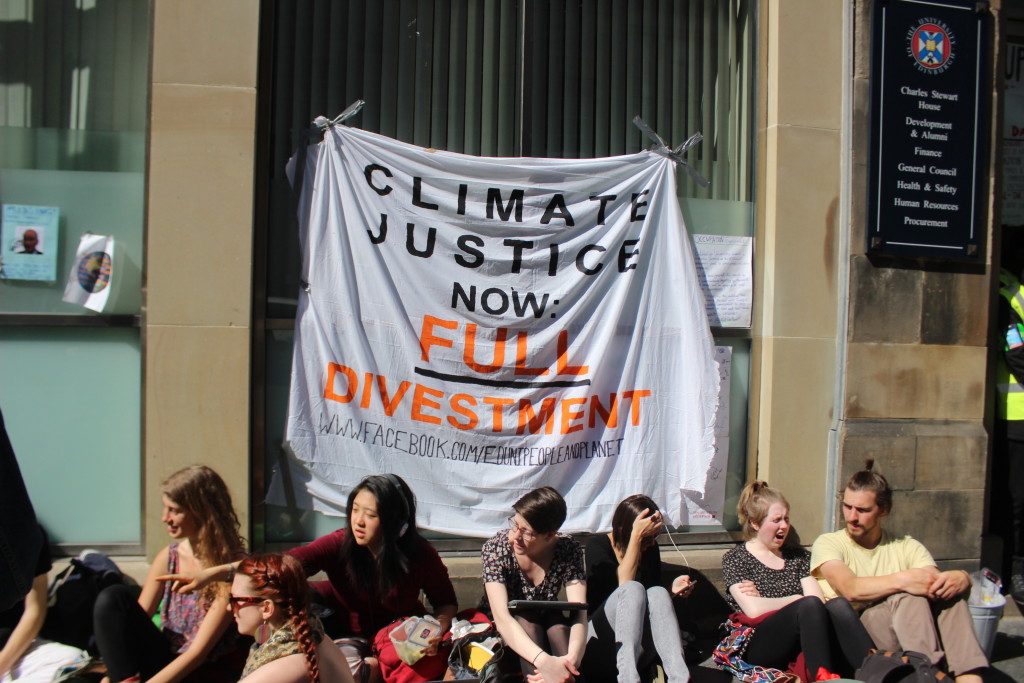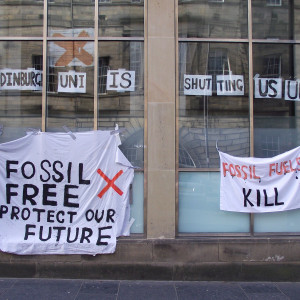MSPs and Nobel Laureates join Fossil Free Occupation, Edinburgh Uni

After seven days at least 40 students are still occupying a central management building in protest at Edinburgh University’s announcement last week that it would not divest its holdings in fossil fuel companies.
The occupation was visited today by John Finnie MSP, member of the Scottish Greens, and Director of WWF Scotland Lang Banks. Alison Johnstone MSP and Greens Co-convenor Maggie Chapman have also spent time with the occupation, as has Nobel Prize winning economist Professor Graciela Chichilnisky (all pictured below).
Inspired by the commitment of #edinburghunifossilfree calling for urgently needed change. Here with @Maggie4Scotland pic.twitter.com/u02qU76SrW
— Alison Johnstone (@AlisonJohnstone) May 15, 2015
Graciela Chichilnisky arrives at @EdUniPandP #edunidivest pic.twitter.com/Fh2WafPT4q
— andrew perry (@andy_pee_tho) May 15, 2015
Campaigners are entering the second week of their occupation. They are supported by hundreds more students and staff. I am one of many academics who stand in solidarity with the occupiers, equally disappointed by Edinburgh University’s failure to act.
In response to the three-year responsible investment campaign, the University declared that it would only consider divestment if ‘realistic alternative sources of energy are available’, and if fossil fuel companies ‘are not investing in technologies that help address the effects of carbon emissions and climate change’. These conditions are vague, weak, and leave open the option for no divestment at all.
Instead of divesting, Edinburgh University promises to ‘engage’ with fossil fuel companies. But they have offered no clear timetable and no clear aims for this engagement.
Over the last 20 years engagement with fossil fuel companies has failed. Companies like BP, Shell and BHP Billiton must get their fossil fuel fix, whatever the cost in destroyed lives, polluted ecosystems and an overheated climate. Fossil fuels are these companies core business – no amount of engagement around the edges will change that fact.
The University has misunderstood the arguments for divestment. Campaigners do not suggest that divestment alone can achieve the change we need. Divestment does not mean an end to fossil fuels overnight. Divestment is designed to put pressure on fossil fuel companies and to rein in their political and financial power.
Instead of following the evidence, the University seems to have given undue attention to special interests in the College of Science & Engineering. Senior academics in this College have admitted that divestment endangers their financial and research relationships with fossil fuel companies.
Edinburgh’s timid approach compares badly with Glasgow, SOAS and Oxford – all of whom have committed to divesting from coal and tar sands. Edinburgh University has put institutional self-interest before good climate sense.
No wonder that many of Edinburgh’s students and staff feel exasperated, let down and angry.
That’s why the occupation will continue until the University meets the demands of the fossil free campaign: unconditional divestment from coal and tar sands and a clear long-term goal for full fossil fuel divestment.
You can read more about the occupation here.


Leave a Reply